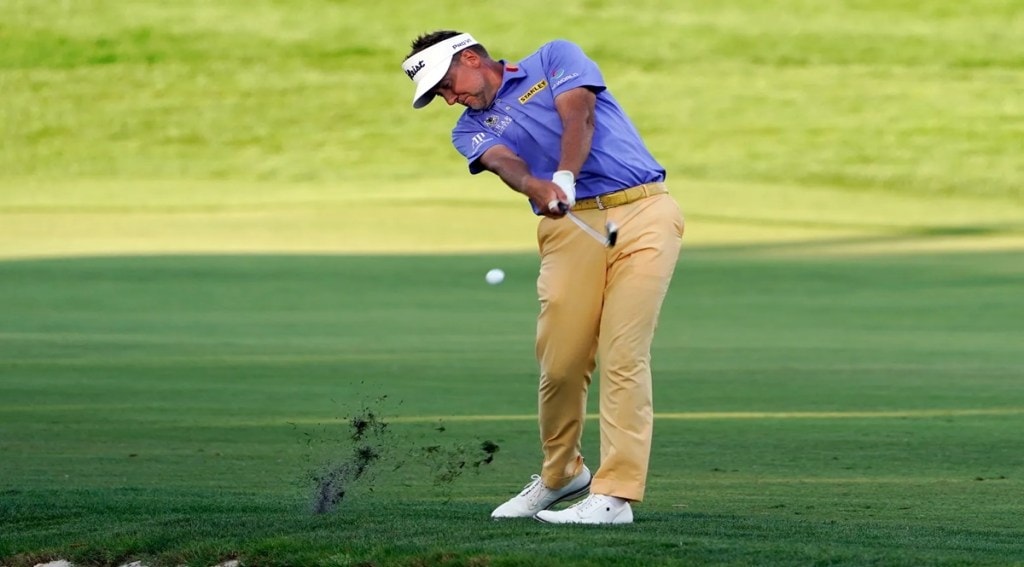While the golf world tittered in a breathless way about Jon Rahm missing the ‘shortest putt in the history of the game’, Phil Mickelson’s gaffe on winning the PGA Tour’s Player Programme (he didn’t, losing the race to bête noire, Tiger Woods), the soap-opera like twists and turns in the tussle for world domination between the major professional tours—the war in Ukraine raged on.
“I believe there are two ways of writing,” PG Wodehouse famously remarked in an interview. “One is making a sort of musical comedy without music and ignoring real life altogether; the other is going deep down into life and not caring a damn…” I’ve been re-reading the English comic novelist’s golf stories of late in what has been, admittedly, a futile exercise to ‘ignore real life altogether.’
Against the backdrop of a country on the fringes of the European Union being invaded and thrown into chaos, writing seriously about issues pertaining to a sport, and largely elite one at that, feels facetious. As it turns out, the moral dilemma hasn’t been lost on people who play the game for a living, either. No one can accuse Ian Poulter, the English golfer, of being reticent. And there he was, dressed in colours of the Ukrainian flag (muted shades, it must be said, by his own standards) during the first round of the Arnold Palmer Invitational. “Yeah, I think it’s hard, when you flick the news on right now and obviously you see the devastation that’s going on around the world and you feel for the people in Ukraine, just wearing a similar colour today in respect to those suffering over there is the least I can do,” Poulter said after his opening 68 at Bay Hill. “Just everyone’s probably thinking of all those families that are affected right now.Who said sport isn’t political?
Of course, sport can continue to be trivial as well. Look no further than Woods’ tweet after winning the PGA Tour’s Player Impact Programme. For those who may not know, the PIP is a new initiative by the Tour to promote the biggest ‘influencers’ in the sport and financially compensate them for their influence off the course, rather than just tournament results. The results take into account several metrics—including Google searches and global media reach—that can be used to quantify a golfer’s added value to the game.
For some bizarre reason, Mickelson conjectured that he’d won the award before it was announced by the Tour. In December 2021, he sent out a tweet back thanking his supporters for helping him claim the $4 million prize. If I was to speculate, I’d think he must have had pretty good reason to believe that he was going to win, and that the whole thing came undone on account of his somewhat bizarre comments of late. Mickelson has severely criticised both, the PGA Tour and the proposed Saudi-led parallel world tourney. What’s been unsettling is the harsh language he’s used to express his thoughts—he’s lost major sponsors over his outbursts.
I’ll admit being as mystified as anyone, disappointed even, with Mickelson’s unjustifiable remarks. And under usual circumstances Woods single-word tweet—‘Whoops’— response to Mickelson’s gaffe would have been par for the course. It seems ill-timed at this juncture given the situation in eastern Europe. As far as Jon Rahm is concerned, I’m sure he would have forgotten that missed putt had it not been for the social media jamboree surrounding the event. It was just a momentary lapse of focus. The world number one missing a ‘sitter,’ that most amateurs would unquestionably concede to a playing partner, or not bother with putting, serves little, if no higher purpose. There’s nothing new to learn here: all of us know the feeling of losing concentration, or getting distracted while taking a swing—but going ahead and hitting the ball anyway. Sometimes we’re lucky, but on most occasions it pans out much that way Rahm’s ball did—further from the hole. And no matter how many times you tell yourself to learn from that mental error, most of us continue fall into the same trap. But we’re amateurs: we don’t usually lose sleep over missed putts. And that’s for the best—at the end of the day, we’re just, as Poulter put it, “…playing a silly game of golf while others in the world are suffering.”
But let’s not end on such a sombre note: it has taken nothing short of my first golf trip overseas in over two years to get me to tee it up and stop sniffling. In Phuket, Thailand—nothing short of a Valhalla for golf—the golf tourism industry is picking up the pieces as the country slowly opens up to welcome back visitors from around the world. It’s been a difficult year for everyone in the travel trade, but there’s an optimism in the air. As I write this, I’m lacing up my shoes to go play Blue Canyon Golf Course. I’m not too concerned about the numbers I’m going to be putting on the scorecard. I’m on a golf vacation and will be teeing it up at one of the finest layouts in Asia—it’s not hard to see this picture from inside the frame.
A golfer, Meraj Shah also writes about the game


